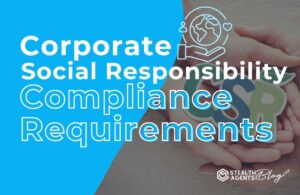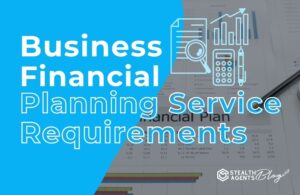Business Loan Requirements
Business Loan Requirements: A Comprehensive Guide
Securing a business loan is often the catalyst that propels an idea into a fully-fledged business venture. The thought of capital infusions and growth opportunities is exhilarating, but the process leading up to that pivotal approval is a meticulous one with its fair share of hurdles. The narrative that usually grips small business owners is the daunting list of ‘requirements’ — financial jargon that can sound more like a gatekeeper language than guidance.
This comprehensive guide is designed to decode the what, why, and how of business loan requirements. Whether you’re a start-up taking its first steps or an established business branching out, understanding this process can save you time, increase your chances for loan approval, and set you on the right footing for the future of your business.
Unboxing Business Loans: The Starting Line
Before we even touch on the nitty-gritty of what a bank or lender may ask you for, it’s important to understand what you’re getting into. Business loans come in various shapes and sizes, catering to different financial needs and situations. You’ve likely heard terms like SBA loans, lines of credit, term loans, and equipment financing. Each type of loan serves a unique purpose, offering different terms and requirements.
When shopping for a loan, think about what you need the money for. Is it for short-term working capital, a large long-term investment, or to even out the ups and downs of cash flow? Understanding your specific needs will dictate which type of loan you should pursue.
Don’t get ahead of yourself! It’s okay to spend more than a New York minute in the shoes of a borrower, reflecting on your business goals and the smartest way to reach them with financial assistance.
Unveiling the Essentials: What Lenders Want
Lenders are in the business of reducing risk and increasing their chances of getting paid back. This means they will ask you for a variety of business loan requirements. Here’s a rundown of the most common:
Credit Score & History
Your personal and business credit score is a litmus test of your creditworthiness. It tells the lender how you’ve handled debt in the past, which is a good indicator for the future. You should aim for a credit score that is considered ‘good’ or ‘excellent’, this is usually somewhere north of 700.
A Robust Business Plan
Your business plan is a roadmap that not only shows your intentions but also your ability to strategize. It should outline your business model, target market, financial projections, and how a loan would be used to further your operations.
Financial Statements
Clear and organized financials are akin to the spine of your business loan application. These will include balance sheets, income statements, and cash flow statements. Lenders look for trends that indicate your business is sustainable and has the ability to repay the loan.
Collateral
For certain types of loans, you might need to put up assets like real estate, equipment, or account receivables as security. This is a way for lenders to protect themselves in case you default on the loan.
*advertisement*
Tired & Overwhelmed With Administrative Tasks?
Hire A Top 1% Virtual Assistant From Stealth Agents!

Sign Up Below & Hire A Top 1% Virtual Assistant
Rated 4.7 Stars Serving Over 2,000+ Customers.
Hire Top 1% Virtual Assistants For $10-$15 Per Hour
Ask About Our 14 Day Trial!
*advertisement*
Personal Guarantees
Especially for small businesses or start-ups, it’s common for lenders to ask for a personal guarantee. This means that you, as the owner, are personally responsible for repaying the loan if the business cannot.
Industry-Specific Criteria
Depending on the nature of your business, lenders might have additional requirements. For instance, a manufacturing company might need to demonstrate compliance with safety regulations, while a service business might need to show professional licensing and certification.
Now that’s quite the checklist! But there’s no need to be overwhelmed. Each of these requirements is manageable with the right approach and preparation.
Pro Tips on Preparing the Perfect (Loan) Package
Meeting the requirements can be a mountain to climb or a checklist to conquer, depending on how you approach it. Here are some strategies to ensure you’re checking off these requirements with confidence:
Fortifying Your Financial Foundations
A good credit score doesn’t just happen overnight and beautiful financial statements don’t write themselves. If you’re contemplating a business loan months or even years from now, consider those key preparations now. Make payments on time, reduce your credit utilization, and check your credit report for discrepancies.
Polishing Your Plan
Your business plan is not just a document for your lender. It’s a tool for growth. It should reflect a deep understanding of your market, competition, and the financial underpinnings of your business. If numbers aren’t your strong suit, consider hiring a professional to assist.
The Art of Organization
Imagine being able to produce any financial document your lender asks for within minutes. An organized business with iron-clad records signals to your lender that you’re serious, and meticulous in your operations.
By focusing on these areas, you’re not just clearing the hurdle of loan requirements. You’re reinforcing the very aspects of your business that will make it successful.
The Ripple Effect of Requirement Fulfillment
Fulfilling these loan requirements isn’t just about getting the loan; it’s about what happens after. By showing banks you are a prime candidate for a loan, you open the door to more flexible terms, lower fees, and better interest rates.
Access to Better Terms
Requirements aren’t there to make your life difficult. They exist to help you. Think of better terms as a reward for being a low-risk borrower. Longer repayment periods, lower interest rates, and greater loan amounts can all be on the table for you.
The Almighty Yes
The question of ‘yes’ or ‘no’ to your loan application is consequential. The requirements are there because they’re indicators of a responsible and viable investment. Meeting these demands increases the likelihood that they’ll answer with an affirmative nod.
A Trustworthy Business Profile
An impressive financial package is a powerful marketing tool for your business. It speaks volumes about your business and can instill confidence in potential investors, partners, and customers.
Preparing for the Prosperous Path
In conclusion, before you approach any lender, know the path you’re on. Prepare methodically to surpass the requirements, not merely meet them. Use it as a way to grow and strengthen your business. Remember, the best time to prepare for a loan is before you need it.
Securing a business loan isn’t about jumping through hoops. It’s about demonstrating your business’s suitability for investment. Take your time, do it right, and when the day comes, you’ll walk into your lender’s office not as a beggar at the gate, but as a business professional securing the next step in your success story.
Recap of Key Takeaways:
• Understand the types of loans and select what’s best for your business.
• Arm yourself with a good credit score and airtight financials.
• Draft a business plan that’s both practical and inspiring.
• Know the particulars that your industry demands.
• And finally, breathe life into those requirements as actionable steps towards your thriving, growing business.










